|
 |
|
|
| |
|
|
|
UNDP-GEF Project on ‘Market Transformation and Removal of Barriers for Effective Implementation of State Action Plan for Climate Change’
|
 IIEC-India recently conducted two successful state level workshops in Jharkhand and Manipur with funding under the UNDP-GEF project – “Market Transformation and Removal of Barriers for Effective Implementation of State Action Plan for Climate Change”. The project’s goal is to facilitate implementation of India’s State Action Plan on Climate Change (SAPCC) in the selected states. IIEC supported these activities by developing a ‘Full Scale Proposal’ document for GEF, in order to augment funding for implementation of selected SAPCC projects. Preparation of this document included developing baselines for the EE and RE sectors, designing nine EE and RE pilot projects for implementation in the two states, and engaging with cross-sectorial stakeholders at all levels of the process. IIEC-India recently conducted two successful state level workshops in Jharkhand and Manipur with funding under the UNDP-GEF project – “Market Transformation and Removal of Barriers for Effective Implementation of State Action Plan for Climate Change”. The project’s goal is to facilitate implementation of India’s State Action Plan on Climate Change (SAPCC) in the selected states. IIEC supported these activities by developing a ‘Full Scale Proposal’ document for GEF, in order to augment funding for implementation of selected SAPCC projects. Preparation of this document included developing baselines for the EE and RE sectors, designing nine EE and RE pilot projects for implementation in the two states, and engaging with cross-sectorial stakeholders at all levels of the process. |
|
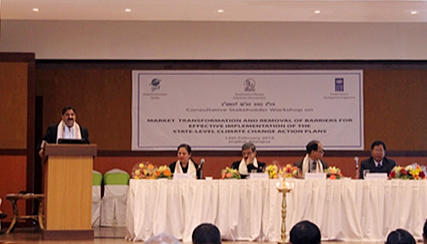
 Delegates at the Project Workshop at Imphal, Manipur, 12th February 2015 Delegates at the Project Workshop at Imphal, Manipur, 12th February 2015 |
| In order to prepare robust baselines for the two states, and to finalize the corresponding pilots, IIEC co-organized two state level workshops with the respective state nodal departments of SAPCC. The workshops drew a high level of distinguished participants, including: Chief Secretaries of the State, Principal Secretary for Energy, Director of the State Renewable Energy Development Agency, members of various state government departments, academic institutions, EE and RE equipment suppliers, project developers, and financial institutions. During the workshops, IIEC shared the project concept with a wide audience, collected information on past and ongoing RE and EE initiatives, and identified key state development priorities/programmes and possibilities for collaboration. The two workshops concluded with finalized state level pilots, and a clear way forward for the project. |
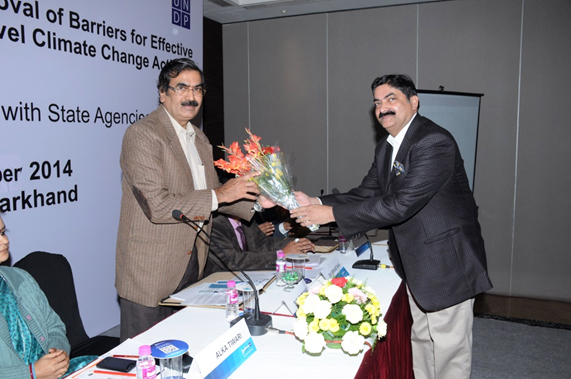
 IIEC-South Asia, Director, Mr Sanjay Dube, felicitating the distinguished guests at the State Level Workshop in Ranchi, IIEC-South Asia, Director, Mr Sanjay Dube, felicitating the distinguished guests at the State Level Workshop in Ranchi,
Jharkhand, 15th December 2015 |
| In order to further support the UNDP-GEF project, IIEC also developed Marginal Abatement Cost Curves (MACC) for the two states. This analysis gives a visual breakdown of the low carbon development pathway, along with corresponding costs and impacts. The MACCs were essential to identifying the most effective EE & RE investment opportunities for Jharkhand and Manipur to reduce GHG emissions. The MACCs analyzed the available mitigation options, emission reduction potential, and marginal cost associated with implementation. The analysis has been completed, and a report highlighting the MACC findings has been submitted to UNDP. An illustration of MACC is presented below. |
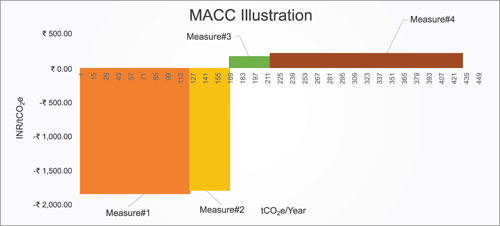 |
| For further information, please contact Sanjay Dube - sdube@iiec.org |
Back to Top  |
|
|
|
|
|
Transforming Pacific Light – IIEC and the PELS Project
 IIEC has been selected by the Secretariat of the Pacific Community (SPC) to develop the Pacific regional Efficient Lighting Strategy (PELS) document. The goal of PELS is to transform the lighting markets in the Pacific to be more energy-efficient, and to consume higher quality, environmentally sound lighting technologies. Preparation of PELS has been undertaken through a consultative approach, and the 2nd working group discussion was organized in Canberra, Australia on 25th February 2015 as part of a larger Pacific Regional Workshop on Equipment Energy Efficiency (E3) and the Pacific Appliance Labelling and Standards (PALS) program, funded by the Government of Australia.
IIEC has been selected by the Secretariat of the Pacific Community (SPC) to develop the Pacific regional Efficient Lighting Strategy (PELS) document. The goal of PELS is to transform the lighting markets in the Pacific to be more energy-efficient, and to consume higher quality, environmentally sound lighting technologies. Preparation of PELS has been undertaken through a consultative approach, and the 2nd working group discussion was organized in Canberra, Australia on 25th February 2015 as part of a larger Pacific Regional Workshop on Equipment Energy Efficiency (E3) and the Pacific Appliance Labelling and Standards (PALS) program, funded by the Government of Australia. |

 From left to right, a group photo of workshop participants, and a general atmosphere of the meeting From left to right, a group photo of workshop participants, and a general atmosphere of the meeting |
| The 2nd PELS working group discussion was facilitated by IIEC with support from Mr. Steve Coyne, a consultant from the United Nations Environmental Programme (UNEP). The discussion was attended by 18 delegates, representing 11 Pacific Island countries. Representatives from SPC, the Australian Government, and the lighting industry also participated and shared their valuable input during the discussion. |
| The PELS working group discussed various issues pertaining to phasing out incandescent lamps and promoting energy-efficient lighting. Some of the topics raised included, the Minimum Energy Performance Standards (MEPS) for lighting products in the Pacific, supporting policies and mechanisms, and environmentally sound lamp waste management. The working group agreed in general that MEPS requirements for non-incandescent technologies will follow the PALS program, and two different MEPS levels for 110-120V and 220-240V power supply will be initially adopted by PELS. The PELS preparation team is planning to finalize the PELS document, and organize a technical validation workshop in 2015. |
|
|
|
|
|
Lao DSM/EE Phase II Project Saves 9.2 GWh per year
 The Lao Demand Side Management and Energy Efficiency Project (DSM/EE) Phase II concluded on the 31st of March 2015 with a final workshop held in Vientiane Capital. IIEC and Electricite du Lao (EdL) co-hosted the final seminar of the DSM/EE Phase II, with funding from the World Bank. The project implemented DSM and EE activities in the residential, commercial, industrial and public sectors. Key activities included the distribution of 400,000 CFLs to households, as well as lighting and A/C retrofits in 50 pilot public buildings; these activities resulted in 9.2 GWh of energy saving per year. The DSM and EE activities carried out under the project are scalable and demonstrate good potential for helping the country reduce its electricity imports during peak demand in the dry season (when demand exceeds the generation capacity of the country’s own hydro power plants).
The Lao Demand Side Management and Energy Efficiency Project (DSM/EE) Phase II concluded on the 31st of March 2015 with a final workshop held in Vientiane Capital. IIEC and Electricite du Lao (EdL) co-hosted the final seminar of the DSM/EE Phase II, with funding from the World Bank. The project implemented DSM and EE activities in the residential, commercial, industrial and public sectors. Key activities included the distribution of 400,000 CFLs to households, as well as lighting and A/C retrofits in 50 pilot public buildings; these activities resulted in 9.2 GWh of energy saving per year. The DSM and EE activities carried out under the project are scalable and demonstrate good potential for helping the country reduce its electricity imports during peak demand in the dry season (when demand exceeds the generation capacity of the country’s own hydro power plants). |
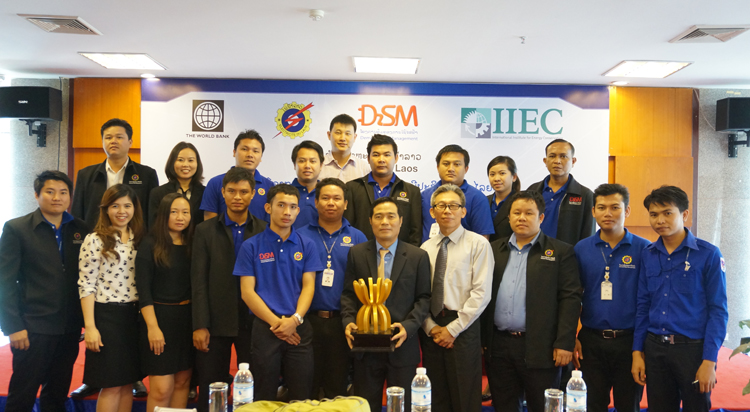
 A Group Photo of the DSM Project Team A Group Photo of the DSM Project Team |
| The final seminar was attended by representatives of the Laotian public authorities, delegates from the World Bank, and other key project stakeholders. During the seminar, participants expressed concerned for national energy security, which is largely affected by the country’s current rapid economic expansion. There was mutual agreement of the tangible benefits delivered through DSM and EE techniques, and representatives expressed their desire for a continuation of the project. Based on project outputs, it is likely that continued work will help Lao PDR scale up its DSM and EE activities and extend benefits to all sectors nationwide. Through such activities, Lao PDR (which is commonly referred to as the battery of Asia), should be able to stop importing, and focus on exporting electricity. |
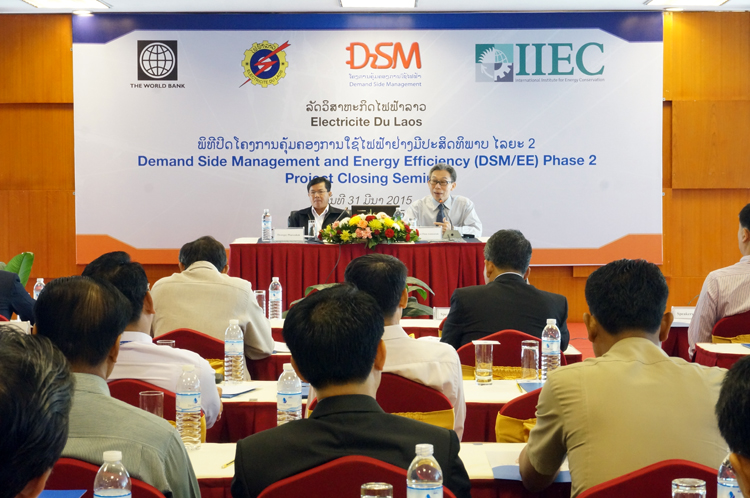
 IIEC-Asia Pacific's Director, Mr. Sommai Phon-Amnuaisuk (right) and Mr. Duangsy Pharanhok, IIEC-Asia Pacific's Director, Mr. Sommai Phon-Amnuaisuk (right) and Mr. Duangsy Pharanhok,
EdL's Managing Deputy Director (left) Delivering Opening Remarks at the Project Closing Seminar, 31st of March 2015 |
|
|
|
|
|
The Road to Efficient Street Lighting – India’s Knowledge Exchange Visit to Thailand and South Korea
 IIEC India was recently awarded a contract by World Bank (WB) to organize a high level knowledge exchange visit on energy efficient street lighting to South Asia. The visit is scheduled to take place during May 2015, and will bring delegates from India to South Korea and Thailand. The Indian delegates will consist of senior officers from select municipalities and senior representatives of Energy Efficiency Services Ltd (a rapidly growing Super ESCO in India). The visit is being organized by IIEC, under the current WB project – Energy Efficient (LED) Street Lighting – Implementation and Financing Solutions”. The visit will provide opportunities for knowledge transfer between India and East Asian nations, with a focus on the design and implementation of Energy Efficient Street Lighting Programs. The exchange will comprise visits to street lighting sites in Thailand and South Korea, as well as one-to-one meetings with Thai and South Korean municipalities, Government officials, and EE equipment manufacturers.
IIEC India was recently awarded a contract by World Bank (WB) to organize a high level knowledge exchange visit on energy efficient street lighting to South Asia. The visit is scheduled to take place during May 2015, and will bring delegates from India to South Korea and Thailand. The Indian delegates will consist of senior officers from select municipalities and senior representatives of Energy Efficiency Services Ltd (a rapidly growing Super ESCO in India). The visit is being organized by IIEC, under the current WB project – Energy Efficient (LED) Street Lighting – Implementation and Financing Solutions”. The visit will provide opportunities for knowledge transfer between India and East Asian nations, with a focus on the design and implementation of Energy Efficient Street Lighting Programs. The exchange will comprise visits to street lighting sites in Thailand and South Korea, as well as one-to-one meetings with Thai and South Korean municipalities, Government officials, and EE equipment manufacturers. |
| For further information, please contact Sanjay Dube - sdube@iiec.org |
Back to Top  |
|
|
|
|
|
Measurement and Verification (M&V) Guide for EE Street Lighting Projects
in India
 IIEC is helping the Alliance for an Energy Efficient Economy to develop a M&V guide for Street Lighting Projects in India. The main purpose of this guide is to make the M&V process transparent and practical, while also being suited to India’s unique conditions. The guide will support ULBs, municipalities, and ESCOs in the development, use, and enforcement of M&V plans for EE Street Lighting projects. The project will be complete soon, with submission of the final deliverable to World Bank in the end of April 2015.
IIEC is helping the Alliance for an Energy Efficient Economy to develop a M&V guide for Street Lighting Projects in India. The main purpose of this guide is to make the M&V process transparent and practical, while also being suited to India’s unique conditions. The guide will support ULBs, municipalities, and ESCOs in the development, use, and enforcement of M&V plans for EE Street Lighting projects. The project will be complete soon, with submission of the final deliverable to World Bank in the end of April 2015. |
| For further information, please contact Sanjay Dube - sdube@iiec.org |
Back to Top  |
|
|
|
|
| |
|
About IIEC
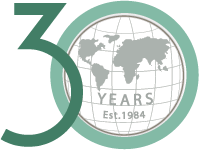 The IIEC was founded in 1984 to dramatically increase the use of energy efficiency as an important clean energy approach in developing countries. We believe local presence is the best way to bring about results, and through our regional offices all over the world, we have been effective in bringing about progress in energy efficiency policy and implementation that has both reduced energy consumption by thousands of MWs and fostered economic development in the countries we serve. The IIEC works with stakeholders across all sectors to connect international best practice with the unique needs of the communities in which we operate, combining sound energy efficiency and renewable energy policy with hands-on implementation in order to reduce greenhouse gas emissions and encourage sustainable development. The IIEC was founded in 1984 to dramatically increase the use of energy efficiency as an important clean energy approach in developing countries. We believe local presence is the best way to bring about results, and through our regional offices all over the world, we have been effective in bringing about progress in energy efficiency policy and implementation that has both reduced energy consumption by thousands of MWs and fostered economic development in the countries we serve. The IIEC works with stakeholders across all sectors to connect international best practice with the unique needs of the communities in which we operate, combining sound energy efficiency and renewable energy policy with hands-on implementation in order to reduce greenhouse gas emissions and encourage sustainable development. |
|
 If you do not wish to receive IIEC E-Notes, please reply to e-notes@iiec.org with the word "UNSUBSCRIBE" in the subject line. If you do not wish to receive IIEC E-Notes, please reply to e-notes@iiec.org with the word "UNSUBSCRIBE" in the subject line. |
| |
 |
Leading the Transition to Clean Energy |
|
|
 |
| Head Office : |
 |
South Asia Office : |
Country Office : |
US Office : |
Thailand
Tel: +66 2 662 3460-4
Fax: +66 2 261 8615
e-mail: iiecbangkok@iiec.org |
India
Tel: +91 11 4182 8216/17
Fax: +91 11 4182 8217
e-mail: iiecindia@iiec.org |
Philippines
Tel: +632 426 8567
Fax: +632 426 8566
e-mail: iiecmanila@iiec.org |
USA
Tel: +1 703 464 0561
Fax: +1 703 689 4427
e-mail: iiecdc@iiec.org |
|
 |
| Copyright © 2015 International Institute for Energy Conservation, All Rights Reserved. |
|
|
